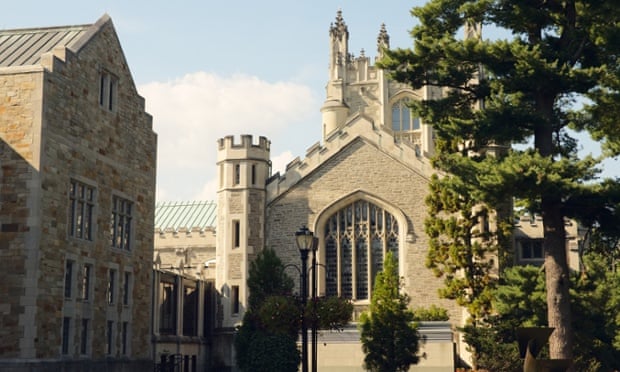Vassar College in New York state has received a $1m prize rewarding it for efforts to get more students from low-income families to graduate, as a private foundation tries to encourage elite colleges to open their doors to more than just those who can afford increasingly high tuition fees.
The Jack Kent Cooke Foundation, named after a Canadian billionaire who ascended from encyclopedia salesman to cable and professional sports magnate, has awarded Vassar with the inaugural million-dollar prize for colleges that enroll and see through to graduation students from low-income backgrounds. The foundation hopes the award will incentivize programs for low-income students with both money and prestige.
In its announcement of the award, the foundation said that Vassar has more than doubled its financial aid budget to more than $60m, and that about 60% of Vassar students receive some aid. Without aid, four years at Vassar costs $198,280.
“Vassar has also steadily increased its enrolment of ‘first generation’ students,” the statement reads, adding that the college has transformed “into a far more socioeconomically diverse college campus” over the past decade.
Vassar president Catharine Hill said the college will use the prize to help the students for which it was awarded, including not only the first students in their families to attend college but the so-called Dreamers, young immigrants protected under Barack Obama’s orders but ineligible for federal aid. She also said the school plans to invest in a program to help transition students from low-income backgrounds to campus life.
“Currently in the US the likelihood of earning a bachelor’s degree depends to a large extent on a person’s family income and race,” Hill said. “This must change for our country to live up to its principles of social advancement for all.
“Government incentives to do so would help, but we don’t need to wait for government policy changes,” she said.
Elite colleges and universities still overwhelmingly enroll students from wealthy backgrounds. These students often have not only the benefit of a strong high school education but alumni parents, specialized courses that boost SAT scores slightly, and parents who can pay or take out loans to afford rising tuition prices. Despite good grades and strong applications, many students from poorer families are nudged to the edges of the admissions pile by these factors.
Vassar ranks at the top of the most economically diverse of top colleges, according to a New York Times analysis last year. Amherst College, Harvard, the University of North Carolina and Pomona College also rank in the top 10 – in part boosted by their billions in endowment money. Schools like Vassar, Amherst and Harvard have led efforts in recent years to diversify incoming classes, expanding financial aid and investing in programs to support students.
Schools closer to the bottom of the list than the top include the University of Chicago, NYU and Villanova. The analysis used only schools with a graduation rate of 75% or more.
While many of the schools have for years cobbled together classes that are ethnically and religiously diverse, with students from around the country and world, wealth remains a prohibitive barrier. The Cooke Foundation earlier this year released a “report card” on schools around the country that argued that states do not support bright, hardworking students nearly as much as they do more affluent students, starting as early as grade school.
